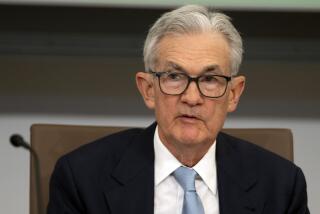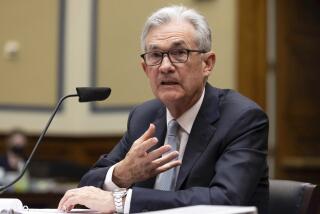Ex-Fed chairman warns of recession
- Share via
HONG KONG — Former Federal Reserve Chairman Alan Greenspan warned Monday that the U.S. economy might slip into recession by year’s end.
He said the U.S. economy has been expanding since 2001 and that there were signs the current economic cycle was coming to an end.
“When you get this far away from a recession invariably forces build up for the next recession, and indeed we are beginning to see that sign,” Greenspan said via satellite link to a business conference in Hong Kong. “For example in the U.S., profit margins ... have begun to stabilize, which is an early sign we are in the later stages of a cycle.”
“While, yes, it is possible we can get a recession in the latter months of 2007, most forecasters are not making that judgment and indeed are projecting forward into 2008 ... with some slowdown,” he said.
Greenspan said that although it would be “very precarious” to try to forecast that far into the future, he could not rule out the possibility of a recession late this year.
The U.S. economy grew at a surprisingly strong 3.5% rate in the fourth quarter of 2006, up from a 2% rate in the third quarter.
A survey released Monday by the National Assn. for Business Economics showed that experts predict economic growth of 2.7% this year, the slowest rate since a 1.6% rise in 2002.
Greenspan also warned that the U.S. budget deficit, which for 2006 fell to $247.7 billion, the lowest in four years, remains a concern.
“The American budget deficit is clearly a very significant concern for all of us that are trying to evaluate both the American economy’s immediate future and that of the rest of the world,” he said via satellite at the VeryGC Global Business Insights 2007 forum.
Greenspan also said he had seen no noteworthy economic spillover from the U.S. housing market slowdown.
“We are now well into the contraction period and so far we have not had any major, significant spillover effects on the American economy from the contraction in housing,” he said.
More to Read
Inside the business of entertainment
The Wide Shot brings you news, analysis and insights on everything from streaming wars to production — and what it all means for the future.
You may occasionally receive promotional content from the Los Angeles Times.










